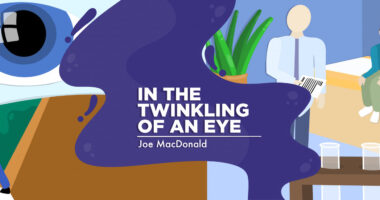Why I Don’t Always Think About Hemophilia

When I tell people I’m married to someone with hemophilia, I get different reactions. Some people are genuinely curious and want to know more about my husband’s condition. They’ll ask several questions about the hows and whys of his bleeds, and are often curious about treatment. On the other hand, some others are quick to judge and automatically assume we live a sad and difficult life.
The reality is that hemophilia is a huge part of my husband’s life. As much as he doesn’t want hemophilia to define the way he chooses to live his life, there are times that it just wants to make itself known. My husband, Jared, has severe hemophilia B, which means that he can get bleeds or injuries for no apparent reason. Some of his worst bleeds are severe enough to keep him in bed for days on end. I’ll admit that these episodes can be stressful to me as well.
On days when my mental health is poor, I can’t help but compare our situation with that of other couples. I’ll catch myself having “maybe” thoughts of all sorts. For example: “Maybe if he didn’t have hemophilia, we would be able to earn more money and buy a nice house like that couple over there.” Or, “Maybe by now I’d be closer to having the peace of mind I desire.” Etc.
These “maybe” thoughts are expressions of envy, anger, and hopelessness. They stem from self-pity, a manifestation of my depression. And if I wallow in them too deeply, I would end up destroying myself.
This is why I choose not to think about hemophilia all the time. It doesn’t mean I ignore the fact of the disorder, it simply means I choose to pay more attention to things that go beyond hemophilia, such as our marriage, our daughter, and our personal sense of fulfillment.
While Jared’s condition is medically serious, in that it requires focused and directed treatment, I make it a point not to take it too seriously at all times. Because if I can think about his condition in a more lighthearted manner, I have more mental space to come up with constructive solutions to the problems it poses.
Sometimes, Jared and I make jokes about his hemophilia and seizure disorder. I also delight in “depression humor” as a means of coping with my depression and anxiety. By bonding over these jokes, we manage to keep our spirits up without having to resort to toxic positivity, or pretending things are OK even if they really aren’t.
In my anxiety and depression support group, inside jokes about mental health conditions are commonly shared. Although these jokes might seem dark and inappropriate, they help create a sense of camaraderie within the group, and many of us can relate. The jokes tend to help us take our focus off ourselves and our negative perceptions of things and divert our thoughts to something less stressful.
There are times our conditions will take over our lives by demanding our attention and time, but we can take back our lives by paying greater attention to the things that will help us move forward, instead of focusing on how the disease keeps us trapped.
***
Note: Hemophilia News Today is strictly a news and information website about the disease. It does not provide medical advice, diagnosis, or treatment. This content is not intended to be a substitute for professional medical advice, diagnosis, or treatment. Always seek the advice of your physician or another qualified health provider with any questions you may have regarding a medical condition. Never disregard professional medical advice or delay in seeking it because of something you have read on this website. The opinions expressed in this column are not those of Hemophilia News Today or its parent company, Bionews, and are intended to spark discussion about issues pertaining to hemophilia.







Leave a comment
Fill in the required fields to post. Your email address will not be published.